construction technology
Havard School
Page 2 out of 20 results
Sort by
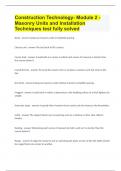
-
Construction Technology- Module 2 - Masonry Units and Installation Techniques test fully solved
- Exam (elaborations) • 2 pages • 2023
- Available in package deal
-
- $14.99
- + learn more
Bond Laying out masonry units to establish spacing. Closure unit The last brick to fill a course. Corner lead A lead built at a corner in which each course of masonry is shorter than the course below it. Crowd the line To touch the mason's line or to place a masonry unit too close to the line. Dry bond Laying out masonry units without mortar to establish spacing. Frogged A style brick in which a depression in the bedding surface of a brick lightens its w...
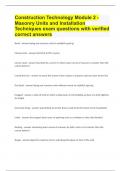
-
Construction Technology Module 2 - Masonry Units and Installation Techniques exam questions with 100% correct answers
- Exam (elaborations) • 2 pages • 2023
- Available in package deal
-
- $14.49
- + learn more
Bond laying out masonry units to establish spacing Closure Unit last brick to fill a course Corner Lead lead built at a corner in which each course of masonry is shorter than the course below it Crowd the Line to touch the mason's line or place a masonry unit too close to the line Dry Bond laying out masonry units without mortar to establish spacing Frogged a style of brick in which a depression in the bedding surface of a brick lightens its weight ...

-
Module Six Masonry Units and Installation Techniques exam questions and answers
- Exam (elaborations) • 5 pages • 2023
- Available in package deal
-
- $15.99
- + learn more
Bond Laying out masonry units to establish spacing. Closure unit The last brick to fill a course Compressive Strength The measure of how much weight a CMU can support without collapsing (measured in psi) Corner lead A lead built at a corner in which each course of masonry is shorter than the course below it Crowd the line To touch the mason's line or to place a masonry unit too close to the line Dry Bond Laying out masonry units without mortar to establi...

-
My Masonry units and Installation Techniques(verified for accuracy)
- Exam (elaborations) • 3 pages • 2023
- Available in package deal
-
- $12.99
- + learn more
scored Before cutting a masonry unit, the line on which the cut will be made must be clouds of dust 25 percent The amount of surface area on an uncored block that has holes extending through it is equal to less than 3/4 inch According to ACI the thickness of a mortar joint cannot exceed buttering The term used to describe applying mortar to block is block require a different spreading technique The main difference between laying block corners and brick corners ...
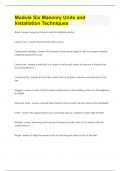
-
Module Six Masonry Units and Installation Techniques
- Exam (elaborations) • 5 pages • 2023
- Available in package deal
-
- $13.99
- + learn more
Bond Laying out masonry units to establish spacing. Closure unit The last brick to fill a course Compressive Strength The measure of how much weight a CMU can support without collapsing (measured in psi) Corner lead A lead built at a corner in which each course of masonry is shorter than the course below it Crowd the line To touch the mason's line or to place a masonry unit too close to the line Frogged A style of brick in which a depression in the beddi...
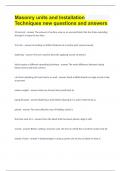
-
Masonry units and Installation Techniques new questions and answers
- Exam (elaborations) • 2 pages • 2023
- Available in package deal
-
- $14.49
- + learn more
25 percent The amount of surface area on an uncored block that has holes extending through it is equal to less than 3/4 inch According to ACIthe thickness of a mortar joint cannot exceed buttering The term used to describe applying mortar to block is block require a different spreading technique The main difference between laying block corners and brick corners rain from splashing dirt and mortar on wall Stand scaffold boards on edge at end of day to prevent ...
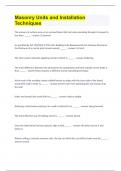
-
Masonry Units and Installation Techniques
- Exam (elaborations) • 2 pages • 2023
- Available in package deal
-
- $13.99
- + learn more
The amount of surface area on an uncored block that has holes extending through it is equal to less than _____. 25 percent As specified by ACI 530/ASCE 5/TMS 402, Building Code Requirements for Masonry Structures, the thickness of a mortar joint cannot exceed _____. 3/4 inch The term used to describe applying mortar to block is _____. buttering The main difference between the procedures for laying block and brick outside-corner leads is that _____. block requires a diffe...
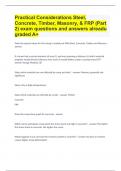
-
Practical Considerations Steel, Concrete, Timber, Masonry, & FRP (Part 2) exam questions and answers
- Exam (elaborations) • 20 pages • 2023
- Available in package deal
-
- $15.49
- + learn more
State the typical values for the Young's modulus of Mild Steel, Concrete, Timber and Masonry If a beam had a second moment of area (I), and was spanning a distance (L) which material property would directly influence how much it would deflect under a constant load (F)? Youngs Modulus (E) State which materials are not affected by creep and why? Masonry, generally not significant Steel, only at high temperatures State which materials are affected by creep? Timber Concr...
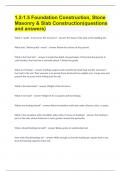
-
1.2-1.5 Foundation Construction, Stone Masonry & Slab Construction(questions and answers)
- Exam (elaborations) • 7 pages • 2023
- Available in package deal
-
- $15.49
- + learn more
What is "grade" in terms for the structure? The slope of the land at the building site. What does "below grade" mean? Below the surface of the ground. What is the frost line? It marks the depth of penetration of frost into the ground. In cold climates, the frost line is normally about 4' below the grade. What are footings? Footings support and transmit the dead load and the structure's live load to the soil. Their purpose is to spread these dead and live weights ov...
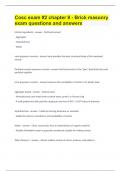
-
Cosc exam #2 chapter 8 - Brick masonry exam questions and answers
- Exam (elaborations) • 8 pages • 2023
- Available in package deal
-
- $14.49
- + learn more
Mortar Ingredients - Portland cement - Aggregate - Hydrated lime - Water sand purpose in mortar Sand provides the basic structural body of the hardened mortar Portland cement purpose in mortar Portland cement is the "glue" that binds the sand particles together Lime purpose in mortar improves the workability of mortar in its plastic state aggregate (sand) - Natural sand - Manufactured sand made from crushed stone, gravel, or furnace slag - A well-gra...

Did you know that on average a seller on Stuvia earns $82 per month selling study resources? Hmm, hint, hint. Discover all about earning on Stuvia


